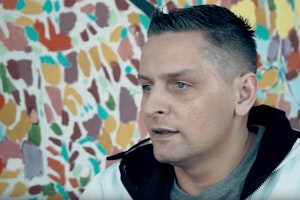Georgia’s Disastrous Attempt to Bring Prisons Up to “European Standards”
By Nika Jeiranashvili & Gavin Slade
You’re standing there completely naked as they beat you—not because you’ve done something wrong or somehow misbehaved, but simply because they want to do it.
—Mikheil, 59He stood up and approached me. I was facing the wall, and he gave me a blow to the kidneys with a truncheon. Then he kicked me between my legs. I needed an operation later, and my left testicle was removed. My kidneys are still damaged—they are too low—and I no longer have any teeth left in my mouth.
—Shota, 57There were lots of them; I can’t say how many of them were beating me, how many fists were flying at me. Then I fell, and the only thing I managed to do was protect my face with my hands.
—Genrikh, 44
Mikheil, Shota, and Genrikh’s stories reflect life in the prison system in Georgia—a system that underwent comprehensive reform intended to destroy Soviet-era institutions. But in its attempt to create prisons of a “European standard,” it appears that Georgia devised something much worse: a testing ground for radical, terrible criminal justice policies.
In 2013, a yearlong study [PDF] by the Open Society Georgia Foundation was launched to investigate the use of torture in prison during Georgia’s prison reform. Our report launched at the end of a decade of extraordinary incarceration growth: from 2003 to 2012, Georgia’s prison population soared by 300 percent, making the small country the fourth-biggest incarcerator per capita in the world by 2010.
Then, following a change of government, in a three-month period beginning at the end of 2012, around half of the 24,000-strong prison population was released in amnesty. By 2014, Georgia’s incarceration rate per capita had fallen to 63rd in the world. Though the amnesty process suffered from a number of flaws—including a failure to involve the judiciary, which would normally be entrusted with establishing whether the individuals concerned were political prisoners—it was recognized that a great number of those released were in prison because of wrongful and in some cases politically tainted prosecutions.
The trigger for this incredible U-turn was the uncovering of grave instances of torture in the penal estate. Those instances are the subject of our report.
Video recordings of humiliating and abusive treatment of prisoners by prison staff had been leaked directly before the change of government on October 1, 2012. The use of abuse and coercion was allegedly one of the bases for order and governance in the Georgian penitentiary system under the government of President Mikheil Saakashvili.
Our study aimed to find out if this was empirically true by answering several questions, including:
- What links can be made between the process of general political and economic change and the use of torture in the system?
- What oversight mechanisms existed, and what did the government and the international community know about torture?
- How prevalent was the use of torture, and what form did it take?
- What have the consequences of imprisonment been for ex-prisoners?
In terms of the first two questions, a documentary review of policies with particular reference to the reform of criminal law and criminal justice institutions was carried out. Furthermore, the research team systematically studied the annual reports of the public defender, as well as those of international bodies such as the Council of Europe’s Committee for the Prevention of Torture.
In terms of the remaining questions, we conducted a survey of 1,199 prisoners and former prisoners, as well as in-depth interviews with torture survivors. The survey and interviews combine to represent a unique dataset on prisoner experiences in the post-Soviet region. Some of the most basic findings of the survey include the following:
- Seventy-five percent of respondents stated that they had been tortured physically, and of these, 39 percent allege that this happened almost every day.
- Almost half of respondents stated they know “many” (six or more) individuals who, as a result of torture and inhumane treatment, had agreed to a plea bargain.
- Seventy-two percent claimed that as a result of imprisonment they have developed a health problem requiring long-term treatment.
- Forty-eight percent of respondents noted that their ability to work has deteriorated or been lost.
It’s important to note that in shifting the prison system away from its Soviet roots, Georgia received a lot of external support from Western actors. Georgia’s prison system was loaned funds by the Council of Europe Development Bank, and was highly praised in 2007 by NATO. The ethos of “zero tolerance” for all crime, announced by the Western-oriented government of Mikheil Saakashvili in 2006, is an American concept, and was used in Georgia to create a dehumanizing discourse around crime and criminals.
Georgia’s Westernizing—and supposedly humanizing—prison reform is a cautionary tale of the need for greater oversight and robustness of response from the international community.
Throughout, the scrutiny of parliament and civil society has been lacking. No parliamentary investigatory commission has investigated the reports of the public defender, and the judiciary and prosecutor’s offices failed to respond. The report shows that impunity for torturers and human rights abusers was endemic. There can be no doubt that this fact alone contributed hugely to practices of torture becoming systemic, creating countless victims.
Unfortunately, our report has no space to fully analyze reforms by the current government since 2012. But it provides a point-by-point list of recommendations to prevent the prison system’s excesses of the past 10 years from happening again. We hope that those in Georgian politics, civil society, and the international community will now be watching intently, and demand and encourage positive future steps away from these painful past events.
Nika Jeiranashvili is a human rights program manager at the Open Society Georgia Foundation.
Gavin Slade is a post-doctoral fellow at the Freie Universitat in Berlin.


